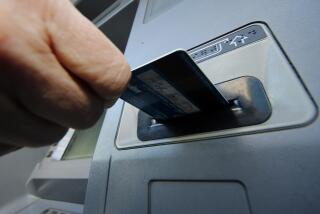Miami’s Vice, L.A.’s Differ
- Share via
When it comes to shopping with stolen and counterfeit credit cards, Los Angeles, New York and Miami have one thing in common: Department stores are the favorite target. But the different personalities of the three cities surface in the crooks’ second choices.
Dining out is Miami’s vice. New York’s jewelry stores hold allure. And here in Tinseltown, it’s stereos and videos.
These are among the fun facts of financial fraud being purveyed by William Neumann, Visa’s chief of security, as he travels the country to warn bankers, merchants and consumers about credit card abuse. The chief source of credit card theft--which totaled $140 million at Visa alone last year--remains the unauthorized use of lost or stolen cards. A growing concern, however, is counterfeit cards, some of which are crude homemade jobs, while others are sophisticated machine-stamped copies. Visa’s counterfeit card losses in 1984 were about $34 million, Neumann said.
The former FBI agent noted that it’s the merchant’s responsibility to verify each transaction, but many are too lazy or hurried to make the phone call. So Visa, with 120 million card holders, and other credit card issuers are now promoting low-cost electronic verification devices that read the magnetic stripe on the back of the card. No one has yet devised a counterfeit “mag” stripe, Neumann said.
Another increasingly popular scam is phony telemarketing offers, a $10-million item at Visa last year. A felon with a phone bank sells fictional items over the phone, taking bank card account numbers for payment. The crook then submits fake sales slips to banks. He may also use the credit card account for real phone or mail-order purchases.
Neumann’s advice:
- Treat all your credit cards with respect. “They’re real money. Protect them.”
- Report lost or stolen cards promptly.
- Destroy the carbons, which carry an imprint of your card number and signature.
- Study your monthly bill carefully and immediately report any charges you’re not responsible for.
- Never give an account number on an unsolicited phone call. Report suspicious pitches to a bank or card issuer.
More to Read
Inside the business of entertainment
The Wide Shot brings you news, analysis and insights on everything from streaming wars to production — and what it all means for the future.
You may occasionally receive promotional content from the Los Angeles Times.










